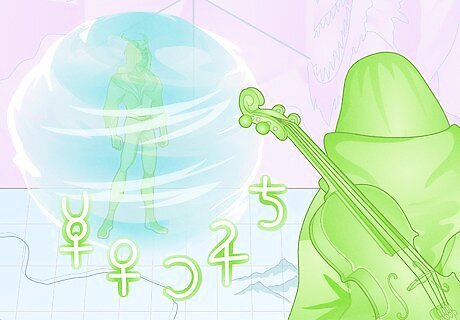
views
- The Magic Initiate feat lets your D&D character learn 2 cantrips and a single 1st-level spell from the bard, cleric, druid, sorcerer, warlock, or wizard spell list.
- The 1st-level spell learned through the Magic Initiate feat can be cast without using a spell slot and replenishes after taking a long rest.
- PCs with the Magic Initiate feat whose class is the same as the class spell list from the feat can also cast their 1st-level spells at higher levels using a spell slot.
What is the Magic Initiate feat?

Magic Initiate is a feat that grants spellcasting to any class. In D&D 5e, feats are additional perks or abilities that your player characters (PCs) can earn independent of their class when they level up. While some classes (which basically determine your character’s skillset) are mainly spellcasters, other classes are martial (meaning they mainly use weapons and physical attacks in combat). However, with the Magic Initiate feat, any PC can have basic access to spells. For example, if you make a sorcerer character, they’d automatically have access to spells because of their class. Still, additional spells (from Magic Initiate) are always useful! However, if you make a rogue character, they might not have many spells at all outside of the few spells they could get from feats like Magic Initiate.
How does the Magic Initiate feat work?

PCs get 2 cantrips and a 1st-level spell from a certain class spell list. In D&D 5e, cantrips are relatively simple spells that can be cast at will without using a spell slot, while level 1 spells are the most basic spells that still require a spell slot to cast. When you take the Magic Initiate feat in D&D 5e, you can choose 2 cantrips and a single 1st-level spell from the wizard, sorcerer, druid, cleric, bard, or warlock spell lists—but all choices have to be from the same list. Once you cast the level 1 spell without using a spell slot, you won’t be able to cast it this way again until you finish a long rest. Additionally, your character’s spellcasting modifier for the spells from this feat correlates to the spellcasting modifier for the class list you chose. If you choose the wizard spell list and pick 3 wizard spells for your character, their spellcasting modifier would come from their Intelligence ability score (since Intelligence is a wizard’s primary stat).

Your PC can cast the spell at higher levels as well. If your character is a spellcaster class with spell slots at their disposal, you can also choose to cast their free level 1 Magic Initiate spell at a higher level. However, they can only do this as long as they’ve got an empty spell slot to do it—and they have the same class as the class spell list you picked for the feat. For example, if you have a bard character and gave them the Magic Initiate feat to learn a new bard spell, you could have them cast that spell (Thunderwave, for example) at a higher level using a spell slot. Magic Initiate doesn’t let you cast any spells as a ritual unless your character already has ritual casting as part of their class skills. If your character is a sorcerer, their Metamagic ability will work on any spell they cast, including spells learned through the Magic Initiate feat.

PCs don’t gain any additional class benefits from this feat. It’s important to keep in mind that taking the Magic Initiate feat in a class your character doesn’t have is not the same as multiclassing. Multiclassing means leveling up in a second (or third) class and gaining abilities from those classes. Magic Initiate gives you limited spells from a particular class, but it doesn’t mean your character has a level in that class. For example, a multiclass character could be a rogue/wizard (with 8 levels in rogue and 2 levels in wizard). On the other hand, a rogue character that gets the Magic Initiate feat hasn’t been multiclassed into a wizard—they’ve just learned a few wizard spells. In short, your character is still the class they were before taking Magic Initiate.
Is Magic Initiate effective?

Magic Initiate is effective because it’s so customizable for characters. When it’s time to choose a feat for your character, this is a solid choice for most classes because there are so many different spell options, from damage-dealing spells for characters who need a little extra impact in battle to utility spells for characters who want to be more adaptable both on the battlefield and while exploring. Magic Initiate can also be used to fill up any “holes” the group has. For example, if you’re playing D&D and notice no character is great at communication or persuasion, you might take the Friends cantrip and the Charm person spell. Finally, Magic Initiate can add a little flavor to your character without fully multiclassing them! For example, maybe your fighter has a little magic because a powerful fey blessed them, or your wizard has warlock spells after surviving a brush with a dark entity.
Spell Choices

Cantrips Normally, spells in D&D 5e have levels (with level 1 spells being the most basic and level 9 spells being the most powerful, complex, and difficult to master). Cantrips, however, are a step below level 1 spells—but come in handy because they’re basically free; they don’t require spell slots to cast, so any character can keep using them even when all other abilities are used up. That’s why cantrip choice is an important part of the Magic Initiate feat! Check out the strongest cantrips available through this feat and what they can do. Friends (Bard, Sorcerer, Wizard, Warlock) grants advantage on all Charisma checks for a limited time. Guidance (Cleric, Druid) lets you add 1d4 to all ability checks for a limited time. Mage Hand (Bard, Sorcerer, Wizard, Warlock) summons a spectral hand that can perform simple tasks. Message (Bard, Sorcerer, Wizard) lets you send brief messages to other creatures. Minor Illusion (Bard, Sorcerer, Wizard, Warlock) lets you create simple illusory sounds and images. Prestidigitation (Bard, Sorcerer, Wizard, Warlock) lets you perform a variety of minor magical tricks. Spare the Dying (Cleric) stabilizes unconscious and dying creatures. Vicious Mockery (Bard) lets you deal damage to foes by insulting them.

1st-Level Spells When it comes to choosing a 1st-level spell as part of the Magic Initiate feat, your choice will likely depend on your character’s needs. Do you want them to have a better armor class (and be more resilient in battle)? Do you need them to have another damage-dealing spell in their repertoire? Whatever your plans for your character, take a look at the most potent level 1 spells and their abilities below. Absorb Elements (Druid, Wizard) halves any fire, acid, cold, lightning, or thunder damage you take. Bless (Cleric) lets 3 creatures of your choice add 1d4 to all attacks and saving throws. Disguise Self (Bard, Sorcerer, Wizard) helps in social situations when you need to change your appearance. Entangle (Druid) restrains affected creatures for up to 1 minute. Expeditious Retreat (Sorcerer, Warlock, Wizard) grants extra movement to help you get around the battlefield faster. Faerie Fire (Bard, Druid) grants advantage against affected foes and highlights invisible creatures. Find Familiar (Wizard) summons an animal companion that can scout, help you in combat, and communicate with you. Hex (Warlock) lets you target a creature and add an extra 1d6 damage to all your attacks on them. Identify (Bard, Wizard) lets you learn the properties of magic items (so you can use them). Shield (Sorcerer, Wizard) gives you +5 to your armor class for 1 round as a reaction. Shield of Faith (Cleric) gives you +2 to your armor class for up to 10 minutes.
Which classes get the most from Magic Initiate?

Artificer Artificers are arcane spellcasters who channel their magic through clever inventions and mechanical creations—and will likely get the most utility out of the wizard version of this feat. Artificers have a lot of spells in common with the wizard spell list, so taking a few extra wizard spells using the Magic Initiate feat can expand your artificer’s arsenal beyond what’s normally possible when selecting spells each time you level up. Absorb Elements and Expeditious Retreat are especially great artificer picks!

Bard Bards are arcane spellcasters who use music, rhythm, and prose to cast spells. Because the normal bard spell list doesn’t have a lot of damage-dealing spells, picking a few damage-heavy cantrips from the wizard or warlock spell lists with Magic Initiate (like Fire Bolt or Eldritch Blast) is especially convenient for bard characters.

Druid Druids are divine spellcasters with close ties to the natural world. Thus, a spell such as Find Familiar from the wizard spell list (with Magic Initiate) is very on-brand and helpful for a druid character! Additionally, cantrips such as Fire Bolt and Shocking Grasp give druid characters extra damage-dealing capabilities—which are especially convenient because cantrips don’t consume spell slots.

Paladin Paladins are holy warriors whose mission is to uphold their sacred oath. They can use cantrips like Booming Blade or Green Flame Blade (both from the sorcerer, wizard, and warlock lists) to increase their damage output. Additionally, the cleric spell list has buffing spells such as Bless, Guidance, and Shield of Faith that might fit well with a paladin character’s skillset.

Ranger Rangers are warriors who specialize in navigating nature and the wilds. While rangers get some lower-level spells naturally as part of their class abilities, Magic Initiate lets ranger characters enjoy a wider skillset with more spellcasting options. Since rangers don’t get many offensive spells, options like Inflict Wounds, Thunderwave, or Burning Hands might be appealing for players!

Rogue Rogues are slippery characters who use stealth and guile to win their battles. Unless you’re playing an Arcane Trickers rogue (which is a specific subclass that grants access to arcane spells), rogues don’t get much in the way of magic—which is why Magic Initiate is an easy way to give your rogue some extra versatility. For example, a rogue character might benefit from a combination of the Friends and Minor Illusion cantrips plus the Disguise Self spell.

Wizard Wizards are powerful arcane casters who master magic through intense study. Wizard characters already have the largest spell list out of all the spellcasting classes. However, there’s still a limit on how many spells a character can learn per level, so the Magic Initiate feat is a great choice if you want your wizard to know as many spells as possible! With Magic Initiate, choosing any of the other spell lists for this feat (especially cleric, druid, or warlock) lets you learn spells your character wouldn’t otherwise know. Meanwhile, choosing the wizard spell lists simply gives you an extra wizard spell.

Cleric Clerics are divine spellcasters who channel power through their faith. They can easily expand their already impressive spellcasting skills with the Magic Initiate feat! Choosing the wizard spell list option likely gives cleric characters the most options, but nearly any spell list would be a solid choice! The only option that wouldn’t be very helpful is the cleric spell list option since clerics can easily swap out spells after each long rest if needed. Find Familiar is great for clerics because it lets them give other players the Help action from a distance!

Fighter Fighters use a wide array of weapons to dominate the battlefield—but Magic Initiate can give your fighter some free utility spells! Eldritch Knight fighters (a subclass with minor spellcasting abilities) can especially benefit from drawing on the wizard spell list through the Magic Initiate feat since they already use wizard spell slots.

Monk Monks are martial artists who can do damage without a weapon in their hands. While this feat isn’t the most obvious choice for monk characters, they can still use it—specifically when it comes to spells that increase a monk’s damage output. Hex could be very useful, as well as Shillelagh (if your monk sometimes uses weapons).

Sorcerer Sorcerers are arcane spellcasters whose power comes from their bloodline. They can definitely make use of the free cantrips and level 1 spell—but because there are so many feats out there, it’s important to remember that sorcerer characters can benefit even more from other spellcasting-related feats. For example, Spell Sniper (which extends the casting range of spells) is invaluable for sorcerers since they tend to fight best at a distance.

Warlock Like sorcerers, warlocks can use this feat, but there are plenty of other feats that could be just as helpful (including Spell Sniper once again, which combines well with damage-dealing cantrips like the warlock’s Eldritch Blast). However, if there’s a specific utility spell you want your warlock to have that they won’t get otherwise (like Find Familiar, for example), then this is still a solid feat choice.

Barbarian Barbarians are primal warriors who rely on strength and fury to fight battles. Barbarian characters probably won’t get much use out of this feat for one key reason: their main class feature is the rage ability (which lets them deal more damage and take less of it in combat, making them juggernauts on the battlefield). However, barbarians can’t cast spells while raging—and since rage is so powerful, it’s more important for barbarians to be able to rage than cast a few low-level spells.




















Comments
0 comment